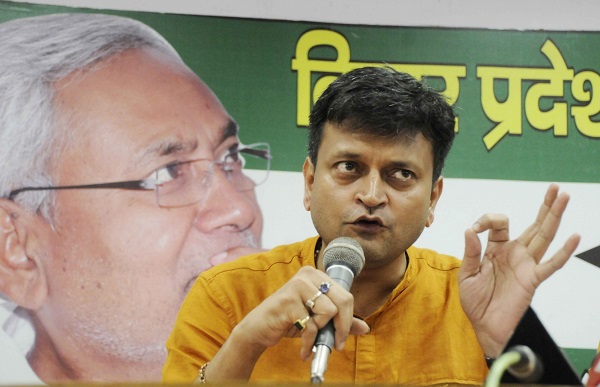Patna, (Samajweekly) Janata Dal United (JD-U) spokesperson Ajay Alok has said that Chief Justice of India NV Ramana’s remark on Nitish Kumar’s liquor ban in Bihar has a little injustice to it.
“I firmly believe that a law was passed unanimously by 243 MLAs and 75 MLCs of the Bihar Vidhan Sabha followed which it was also accepted by the governor of Bihar and the President of India. Still CJI had said short-sighted decision, it is a little injustice to it,” Alok said while interacting with media persons in Patna on Wednesday.
“I also believe that if legislators would do their work under the limits of the Constitution, the comment of the judiciary is not right. When it comes to pending cases, I must say that pending cases were there in the court before the implementation of the liquor ban in Bihar,” Alok said.
“We should pay attention to how the hearing of the cases and their decisions would come in quick time. There is a phrase in English called justice delayed is justice denied. There are 4 lakh cases pending in the courts of the country,” he said.
“If bureaucracy, judiciary and legislature comment on each other, it would create confusion in society. The Chief Justice of India is an institution which is respected by everyone in the country. If my point is wrong by any means, I am also apologizing for it,” he said.
“As a citizen of the country, I firmly believe that bureaucracy, judiciary and legislature should not interfere in their respective work and avoid commenting on each other,” Alok said.
The Chief Justice of India had said that decisions like the liquor ban in Bihar in 2016 “put a huge burden on courts.
“There are three lakh cases pending in the courts. People are waiting for justice for a long time and now the excessive cases related to liquor violations put additional burden on courts,” he said.
The Chief Justice was at Sidhartha law college in Vijayawada on December 27 and put forth his point of view during a discussion on the subject of futuristic challenges in the Indian judicial system.
Ramana pointed out that every policy needs to be addressed with futuristic planning, its evaluation and constitutionality before its implementation on the ground.
“The applications pertaining to bails in liquor prohibition act are submitted in large numbers in the high court. Due to short-sighted policies implemented by different governments, it is affecting the work of courts in the country. Every law needs to be discussed thoroughly and with solid points before implementation,” Ramana said.










